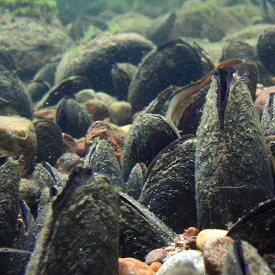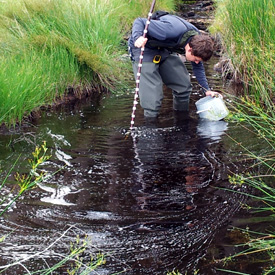We have strived to raise awareness of this species and its conservation whenever and wherever appropriate. During commissioned and voluntary surveys, the Alba Ecology team has come across many illegal pearl fishing kills and in an attempt to stop these, we have in partnership with colleagues Lee Hastie and Iain Sime written an article in 2012 entitled ‘Wildlife Crime and Scottish Freshwater Pearl Mussels’ in British Wildlife magazine. From this work and SNH press releases, media coverage of this under-reported wildlife crime has grown and included an invitation to provide a discussion piece for Mark Avery’s influential blog (http://markavery.info/2012/10/29/guest-blog-mollusc-glen-peter-cosgrove/).
In 2013, the MSP Mary Scanlon became ‘Species Champion’ for pearl mussels. In a voluntary capacity, Peter has advised Mary on pearl mussels. Mary’s interest and enthusiasm resulted in a debate on pearl mussel conservation in the Scottish Parliament. With the help of Scottish Wildlife Link, we attended what was the first debate in the Scottish Parliament on invertebrate conservation. Mary works closely with other parliamentarians and there was much interest from all parties in the debate.
The Mollusc of the Glen team is regularly invited to speak and make presentations to a range of different audiences. For example, we spoke on the plight of freshwater pearl mussels at the launch of ‘The State of Nature’ report with Sir David Attenborough at the Natural History Museum, London in May 2013. Peter has also undertaken many TV and radio interviews on the subject of pearl mussels. Alba Ecology’s Donald Shields is a fluent Gaelic speaker and radio broadcaster and he has been involved in a number of Gaelic radio programmes in which pearl mussel have featured.
Working with Partners
Recently, Peter worked with and encouraged the Forestry Commission Scotland to undertake a series of surveys of watercourses on their estate. Alba Ecology’s Donald Shields and Cameron Cosgrove undertook these and discovered a brand new pearl mussel population for science in a small, remote and previously unsurveyed north of Scotland watercourse.
In 2013 we discovered and surveyed a hugely important population of freshwater pearl mussel. This unexploited and undescribed population is now recognised as the most important freshwater pearl mussel population in Scotland and the UK. It is the only such population known to science and is a suitable benchmark/reference site for European conservation work. Historically, many Scottish pearl mussel rivers would have held mussels in the densities found in this unexploited site. We have written a detailed scientific paper on our discovery, which was recently accepted for publication.
If you would like to find out more about Mollusc of the Glen, please contact Dr Peter Cosgrove on 01479 870238














